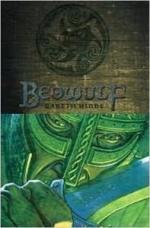[41]
{Queen Wealhtheow greets Hrothgar, as he sits beside Hrothulf, his nephew.}
40 Uncle
and nephew; their peace was yet mutual,
True
each to the other. And Unferth the spokesman
Sat
at the feet of the lord of the Scyldings:
Each
trusted his spirit that his mood was courageous,
Though
at fight he had failed in faith to his kinsmen.
45 Said
the queen of the Scyldings: “My lord and
protector,
Treasure-bestower,
take thou this beaker;
Joyance
attend thee, gold-friend of heroes,
{Be generous to the Geats.}
And
greet thou the Geatmen with gracious responses!
So
ought one to do. Be kind to the Geatmen,
50 In gifts
not niggardly; anear and afar now
Peace
thou enjoyest. Report hath informed me
Thou’lt
have for a bairn the battle-brave hero.
Now
is Heorot cleansed, ring-palace gleaming;
{Have as much joy as possible in thy hall, once more purified.}
Give
while thou mayest many rewards,
55 And bequeath
to thy kinsmen kingdom and people,
On
wending thy way to the Wielder’s splendor.
I
know good Hrothulf, that the noble young troopers
{I know that Hrothulf will prove faithful if he survive thee.}
He’ll
care for and honor, lord of the Scyldings,
If
earth-joys thou endest earlier than he doth;
60 I reckon
that recompense he’ll render with kindness
Our
offspring and issue, if that all he remember,
What
favors of yore, when he yet was an infant,
We
awarded to him for his worship and pleasure.”
Then
she turned by the bench where her sons were carousing,
65 Hrethric
and Hrothmund, and the heroes’ offspring,
{Beowulf is sitting by the two royal sons.}
The
war-youth together; there the good one was sitting
’Twixt
the brothers twain, Beowulf Geatman.
[1] For 1130 (1) R. and Gr. suggest ‘elne unflitme’ as 1098 (1) reads. The latter verse is undisputed; and, for the former, ‘elne’ would be as possible as ‘ealles,’ and ‘unflitme’ is well supported. Accepting ‘elne unflitme’ for both, I would suggest ‘very peaceably’ for both places: (1) Finn to Hengest very peaceably vowed with oaths, etc. (2) Hengest then still the slaughter-stained winter remained there with Finn very peaceably. The two passages become thus correlatives, the second a sequel of the first. ‘Elne,’ in the sense of very (swiethe), needs no argument; and ‘unflitme’ (from ‘flitan’) can, it seems to me, be more plausibly rendered ‘peaceful,’ ‘peaceable,’ than ‘contestable,’ or ‘conquerable.’
[2] Some scholars have proposed
‘roden’; the line would then read:
Then the building was reddened,
etc., instead of ‘covered.’ The
‘h’
may have been carried over
from the three alliterating ‘h’s.’




